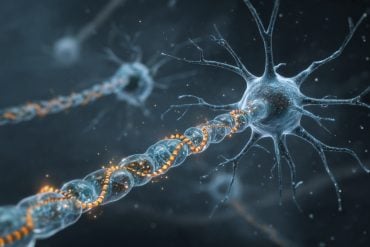Summary: Degarelix, a drug that reduces testosterone levels, shows potential in the treatment of pedophilic disorder. Men with a history of child sexual abuse who took the drug had reduced overall sexual desire and decreased attraction toward children, with noticeable effects within two weeks.
Source: Karolinska Institute
A drug that lowers levels of the male hormone testosterone in the body reduces the risk of men with pedophilic disorder sexually abusing children, a study from Karolinska Institutet published today in the journal JAMA Psychiatry shows.
About one in ten girls and one in twenty boys are sexually abused, primarily at the hands of men with pedophilic disorder. Despite law enforcement, technical and political initiatives, the rate of child sexual abuse continues to rise, above all that committed online. There is therefore a pressing need for effective and scientifically proven treatments for people at risk of committing sexual offence.
Researchers at Karolinska Institutet and Gothenburg University in Sweden have now evaluated the effect of a drug called degarelix, which is approved for the treatment of prostate cancer. The drug acts by switching off the production of testosterone, reducing within a matter of hours the levels of the hormone in the body, and is administered by injection every three months.
The double-blinded study included 52 men with pedophilic disorder in Sweden, who were randomly assigned to a degarelix or a placebo group. Treatment with degarelix was shown to dampen two critical risk factors for committing abuse: high sexual desire and sexual attraction to children. The effects were noticeable within two weeks.
“It’s important to be able to offer a relatively fast-acting treatment, and the patients’ own experiences of the drug were overall positive,” says study leader Christoffer Rahm, chief psychiatrist at Psykiatri Södra Stockholm and researcher at the Department of Clinical Neuroscience, Karolinska Institutet.
Above all, the men described positive effects on their sexuality. Many reported that they felt an inner calm, that thoughts of sex were no longer dominant and that they lost their sexual interest in children. A majority wanted to continue on the drug after the study was over.

“This study is an important step towards an evidence-based treatment for pedophilic disorder,” says Dr Rahm. “We’re now planning a new study to assay the longer term effects of the drug and to compare them with psychotherapy.”
All participation was voluntary and the men were recruited via Preventell, a national helpline initiated by ANOVA, an andrology, sexual medicine and transmedicine clinic at Karolinska University Hospital in Sweden. The helpline was set up to prevent sexual abuse and violence by fast-tracking people with dangerous or undesired sexuality into specialised treatment.
While some of the participants in the degarelix group developed hot flashes and reactions at the injection site, conclusions about any mental side-effects were hard to draw since many of the participants were already in a depressive state even before the study started. See the scientific article for a full list of effects and adverse reactions.
Funding: The study was financed by the Swedish Society of Medicine, the Söderström-Königska Foundation, the Fredrik and Ingrid Thuring Foundation, the Centre for Psychiatric Research at Karolinska Institutet (Department of Clinical Neuroscience), the Gothenburg Society of Medicine, Skaraborg Hospital research unit, Region Stockholm (ALF funding), and the Swedish Society for Medical Research. Knowledge partner ECPAT Sweden.
About this psychology research article
Source:
Karolinska Institute
Media Contacts:
Press Office – Karolinska Institute
Image Source:
The image is in the public domain.
Original Research: Open access
“Effect of Gonadotropin-Releasing Hormone Antagonist on Risk of Committing Child Sexual Abuse in Men With Pedophilic Disorder: A Randomized Clinical Trial”. by Valdemar Landgren, Kinda Malki, Matteo Bottai, Stefan Arver, Christoffer Rahm.
JAMA Psychiatry doi:10.1001/jamapsychiatry.2020.0440
Abstract
Effect of Gonadotropin-Releasing Hormone Antagonist on Risk of Committing Child Sexual Abuse in Men With Pedophilic Disorder: A Randomized Clinical Trial
Importance
Evidence-based treatments from randomized clinical trials for pedophilic disorder are lacking.
Objective
To determine whether a gonadotropin-releasing hormone antagonist reduces dynamic risk factors for committing child sexual abuse.
Design, Setting, and Participants
This academically initiated, double-blind, placebo-controlled, parallel-group, phase 2 randomized clinical trial was conducted at the ANOVA center in Stockholm, Sweden, from March 1, 2016, to April 30, 2019. Individuals who contacted PrevenTell, the national telephone helpline for unwanted sexuality, were recruited. Eligible participants were men seeking help aged 18 to 66 years with a pedophilic disorder diagnosis and no contraindications to the intervention. The primary end point was assessed by intent-to-treat analysis.
Interventions
Randomization to receive either 2 subcutaneous injections of 120 mg of degarelix acetate or equal volume of placebo.
Main Outcomes and Measures
The primary end point was the mean change between baseline and 2 weeks in the composite risk score of 5 domains of child sexual abuse ranging from 0 to 15 points; each domain could be rated from 0 to 3 points. Secondary end points included efficacy at 2 and 10 weeks as measured by the composite score, each risk domain, quality of life, self-reported effects, and adverse events.
Results
A total of 52 male participants (mean [SD] age, 36 [12] years) were randomized to receive either degarelix (n = 25; with 1 withdrawal) or placebo (n = 26). At 2 weeks, the composite risk score decreased from 7.4 to 4.4 for participants in the degarelix group and from 7.8 to 6.6 for the placebo group, a mean between-group difference of –1.8 (95% CI, –3.2 to –0.5; P = .01). A decrease was seen in the composite score at 10 weeks (−2.2 [95% CI, −3.6 to −0.7]) as well as in the domains of pedophilic disorder (2 weeks: −0.7 [95% CI, −1.4 to 0.0]; 10 weeks: −1.1 [95% CI, −1.8 to −0.4]) and sexual preoccupation (2 weeks: −0.7 [95% CI, −1.2 to −0.3]; 10 weeks: −0.8 [95% CI, −1.3 to −0.3]) in the degarelix group compared with the placebo group. No difference was seen for the domains of self-rated risk (2 weeks: −0.4 [95% CI, −0.9 to 0.1]; 10 weeks: −0.5 [95% CI, −1 to 0.0]), low empathy (2 weeks: 0.2 [95% CI, −0.3 to 0.6]; 10 weeks: 0.2 [95% CI, −0.2 to 0.6]), and impaired self-regulation (2 weeks: −0.0 [95% CI, −0.7 to 0.6]; 10 weeks: 0.1 [95% CI, −0.5 to 0.8]), or quality of life (EuroQol 5 Dimensions questionnaire index score, 2 weeks: 0.06 [95% CI, −0.00 to 0.12], and 10 weeks: 0.04; 95% CI, −0.02 to 0.10; EuroQol visual analog scale, 2 weeks: 0.6 [95% CI, −9.7 to 10.9], and 10 weeks: 4.2 [95% CI, −6.0 to 14.4]). Two hospitalizations occurred from increased suicidal ideation, and more injection site reactions (degarelix: 22 of 25 [88%]; placebo: 1 of 26 [4%]) and hepatobiliary enzyme level elevations were reported by participants who received degarelix (degarelix: 11 of 25 [44%]; placebo: 2 of 26 [8%]). Among the 26 participants randomized to receive degarelix, 20 (77%) experienced positive effects (eg, improved attitude or behavior) on sexuality and 23 (89%) reported adverse effects on the body.
Conclusion and Relevance
This trial found that degarelix reduced the risk score for committing child sexual abuse in men with pedophilic disorder 2 weeks after initial injection, suggesting use of the drug as a rapid-onset treatment option. Further studies are warranted into the effects and long-term adverse effects of hormone deficiency.
Trial Registration
EU Clinical Trials Register Identifier: 2014-000647-32
Feel Free To Share This Neuropharmacology News.






